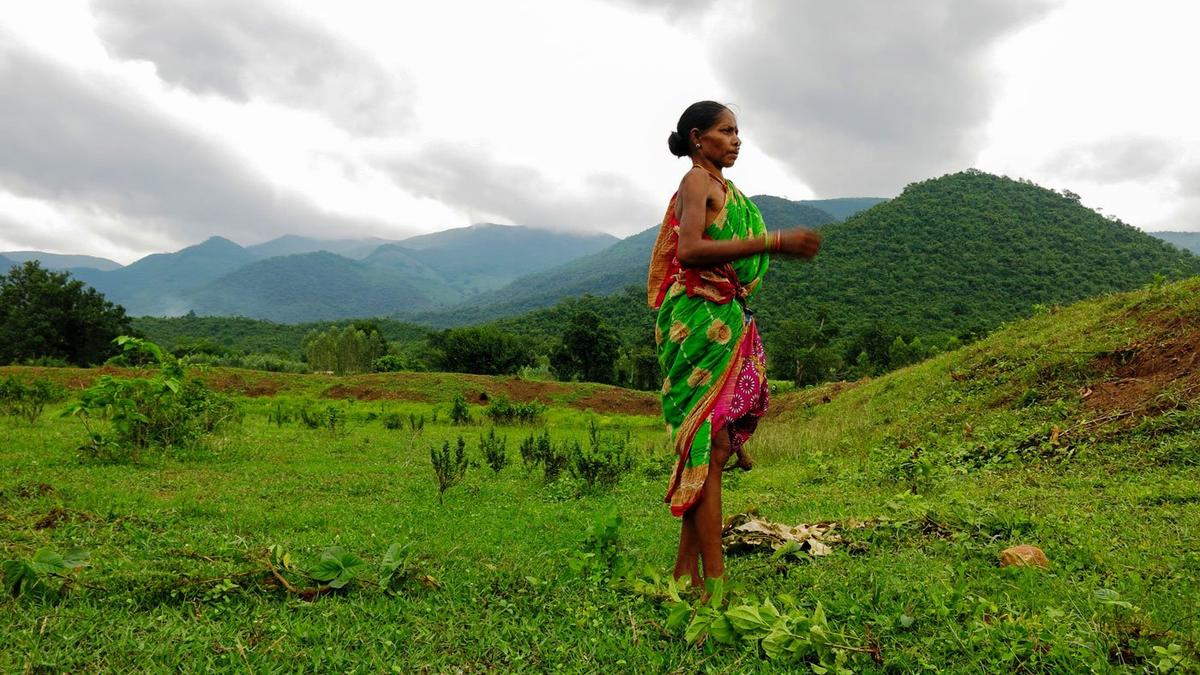
Why communities should regain their heirloom seeds and knowledge systems Premium
The Hindu
Kunuji Kulusika crouches over a silver plate on which numerous little piles of seeds are arranged and reels off their names. There are about a dozen-odd types of seeds on the plate, including beans, small beans, horse gram, pigeon peas, mustard, corn, and niger seeds, a collection that Kunuji is evidently proud of, going by the broad smile she offers as she finishes going over the names. “These are seeds we have always grown,” we hear her say in Seed Stories, a recently released documentary directed by Chitrangada Choudhury. “A bit of this, a bit of that... many different things... that is how we farm,” continues the ebullient Kunuji, an indigenous agroecological farmer who lives in the Niyamgiri mountains of Odisha’s Eastern Ghats, where the film is set. “Why should we go to the market for seeds?”
Kunuji Kulusika crouches over a silver plate on which numerous little piles of seeds are arranged and reels off their names. There are about a dozen-odd types of seeds on the plate, including beans, small beans, horse gram, pigeon peas, mustard, corn, and niger seeds, a collection that Kunuji is evidently proud of, going by the broad smile she offers as she finishes going over the names. “These are seeds we have always grown,” we hear her say in Seed Stories, a recently released documentary directed by Chitrangada Choudhury. “A bit of this, a bit of that... many different things... that is how we farm,” continues the ebullient Kunuji, an indigenous agroecological farmer who lives in the Niyamgiri mountains of Odisha’s Eastern Ghats, where the film is set. “Why should we go to the market for seeds?”
This documentary, which was screened at the National Centre for Biological Sciences (NCBS) in collaboration with the Bengaluru Sustainability Forum (BSF), is part of Climate Charche, a series hosted and curated by BSF. According to the concept note for Climate Charche, the series is envisaged as a series of engagements on the interlinkages between different aspects of climate change and city systems. “These engagements for dialogue, deliberation and learning will be facilitated across different audience groups in the city, with an aim to exchange knowledge, and identify gaps in city level plans; foregrounding adaptation, resilience and climate justice,” it states.
Seed Stories is a nuanced exploration of the efforts of barefoot ecologist Dr. Debal Deb and his team and their attempt to conserve over 1,000 endangered heirloom varieties of rice in a landscape starting to be besieged by genetically modified cotton seeds and the toxic chemicals needed to grow them. The documentary“takes a worm’s eye view of how this is reshaping a geography and a people steeped in agroecological knowledge, and altering their attitudes towards farming, food and ecology,” states the synopsis. It also invites its audience to reflect on the question of what sustainability really is.
Choudhury, an award-winning journalist and researcher based in Goa, says the film is part of a larger body of work that she has been working on for nearly two decades. “I am from Orissa, but I’ve spent the initial years of my journalistic career in Bombay and Delhi, reporting on Schedule Five landscapes: essentially areas where Scheduled Tribe populations are significant, like parts of Chhattisgarh, Jharkhand and Orissa,” she says.
Her reportage often focuses on how mainstream development often translates into brutal and horrific forms of violence inflicted on the communities that live in these landscapes. “It is often justified in the name of development of the nation,” says Choudhury, pointing out that these indigenous communities were often denigrated and seen as being backwards in mainstream policy and media narratives “because, how else do you justify the violence of the development project?”
Choudhury first met Deb in 2014 while profiling him for a national daily. Deb, she says, is sceptical about what he terms as a ‘develop-mentality’ — a project that demands an endless cycle of inputs, outputs, consumption and waste on a finite planet.
Choudhury and her associate director, Aniket Aga, then began volunteering at Deb’s Basudha farm in the Rayagada district in southern Odisha from 2018 onwards. It was then that she noticed how, in this ecologically rich and sensitive part of India, there was a wealth of knowledge among the local people about sustaining biodiversity while maintaining their own food sovereignty. “This has largely disappeared now from the so-called developed parts of India, where communities have lost their own seeds and knowledge systems.”

Andhra Pradesh CM Chandrababu Naidu inaugurates CNG, PNG projects in Rayalaseema region. Andhra Pradesh has the unique distinction of being the second largest producer of natural gas in India, thanks to the Krishna-Godavari (KG) Basin, he says, adding the State will lead the way towards net-zero economy.










